Event Virtual
Options of Engagement and Participation Modalities for Major Groups and Stakeholders to the OEWG on a Science-Policy Panel to Contribute Further to the Sound Management of Chemicals and Waste and to Prevent Pollution | Road to OEWG 2 Series

26 Sep 2023
14:00–15:30
Venue: Online | Webex
Organization: United Nations Environment Programme, Ad hoc open-ended working group on a science-policy panel on chemicals, waste and pollution prevention
This event is part of the Science-Policy Panel to Contribute Further to the Sound Management of Chemicals and Waste and to Prevent Pollution Webinar Series aiming to building bridges and promote collaboration and knowledge sharing between and among stakeholders, and to raise public awareness about the OEWG preparing proposals for the establishment of the panel. The webinar series was co-organized by the Secretariat of the OEWG and the Geneva Environment Network.
About this Session
This briefing forms part of the webinar series in the context of Ad Hoc Open-Ended Working Group on a science policy panel to contribute further to the sound management of chemicals and water and to prevent pollution
At its resumed fifth session, held in Nairobi from 28 February to 2 March 2022, the United Nations Environment Assembly decided, by resolution 5/8, to establish a science-policy panel to contribute further to the sound management of chemicals and waste and to prevent pollution.
This webinar informed participants on the accreditation and participation modalities for the OEWG for major groups and stakeholders and the invitation is extended to all interested participants from civil society who have attended previous meetings and who plan to engage along in the process on the way to OEWG 2. The objective of this webinar is to enhance understanding of the participation of observers at the meetings of the OEWG in its intersessional work, sharing information on how MGS can participate and contribute to the work of OEWG.
During this webinar, current and past observers shared their experience on how they contributed and are contributing to the work of the OEWG. This webinar provided a brief overview on the work being undertaken until now and which documents will be discussed during the second session of the ad hoc open-ended working group will be held in person at the King Hussein Bin Talal Convention Centre, Dead Sea, Jordan, from 11 to 15 December 2023.
Road to OEWG 2 Series
In preparation for the second session, the Road to OEWG 2 | Science-Policy Panel to Contribute Further to the Sound Management of Chemicals and Waste and to Prevent Pollution webinar and event series, co-organized by the OEWG Secretariat and Geneva Environment Network aims to build bridges between and among stakeholders, and promote collaboration and knowledge sharing in preparation for OEWG 2 in December 2023.
Previous webinars and events in the series have focused on the process for establishing a science-policy panel, its scope and possible structure (24 January 2023); lessons learned the Intergovernmental Panel on Climate Change (IPCC), Intergovernmental Science-Policy Platform on Biodiversity and Ecosystem Services (IPBES), International Resource Panel (IRP), Montreal Protocol, and World Health Organization (WHO) (5 October 2022); the scope of the panel (25 July 2022), operating principles of existing science-policy interfaces mentioned above, (26 April 2023); building bridges between and among stakeholders and raising awareness about the OEWG process (2 May 2023 as a side event to the 2023 BRS COPs); and how members of the Society of Environmental Toxicology and Chemistry (SETAC) can contribute their scientific expertise throughout the process (1 May 2023, during the European Special Session of SETAC Annual Meeting).
Speakers

Tessa GOVERSE
Principal Officer, Secretariat of the OEWG on a Science-Policy Panel on Chemicals, Waste and Prevention of Pollution, UNEP

Gudi ALKEMADE
Chair, OEWG on a Science-Policy Panel on Chemicals, Waste and Prevention of Pollution | Deputy Permanent Representative to UN Environment Programme, Netherlands
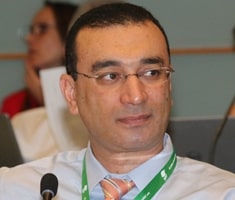
Mohamed ABDELRAOUF
Co-Chair, Science and Technology Major Group to UNEP

Mrinalini RAI
Director, Women4Biodiversity
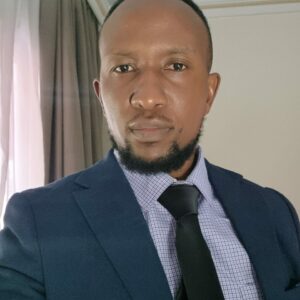
David MUNENE
Regional Co-Facilitator of Major Groups and Stakeholders, Africa
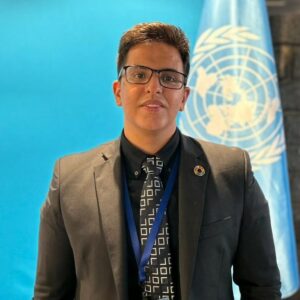
Aseel ABO-TALEB
Chemicals, Waste and Pollution Facilitator, Children and Youth Major Group to UNEP

Nalini SHARMA
Programme Management Officer, Secretariat of the OEWG on a Science-Policy Panel on Chemicals, Waste and Prevention of Pollution, UNEP

Laetitia ZOBEL
Programme Management Officer, Civil Society Unit, Governance Affairs Office, UNEP | Moderator
Agenda
Opening
Tessa GOVERSE | Principal Officer, Science-Policy Panel on Chemicals, Waste and Prevention of Pollution, UNEP
- During the 5th Session of the United Nations Environment Assembly (UNEA-5) held in March 2022, governments, international and non-governmental organizations, and civil society recognized the need for a science-policy panel to strengthen the science-policy interface at all levels. This resulted from previous discussions both withing the context of previous UNEAs and in relation to the the Beyond 2020 framework, wchihc successor is currently being negotiated in ICCM5 in Bonn.
- UNEA resolution 5/8 highlights how the SPP could support countries in their efforts to take action , to implement multilateral environmental agreements (MEAs) and other international instruments, as well as advocating for collaboration with the private sector and other relevant stakeholders in their work. Pursuant the resolution, an open-ended working group (OWEG) was established to prepare proposals for a SPP and to begin its work in 2022 with the ambition of completing it by the end of 2024.
- The aim of this webinar is to gather inputs and proposals from major groups and stakeholders, who are both valuable contributors and end users of the panel’s deliverables.
Timeline of the Open-Ended Working Group to establish a SPP on Chemicals, Waste and Pollution Prevention
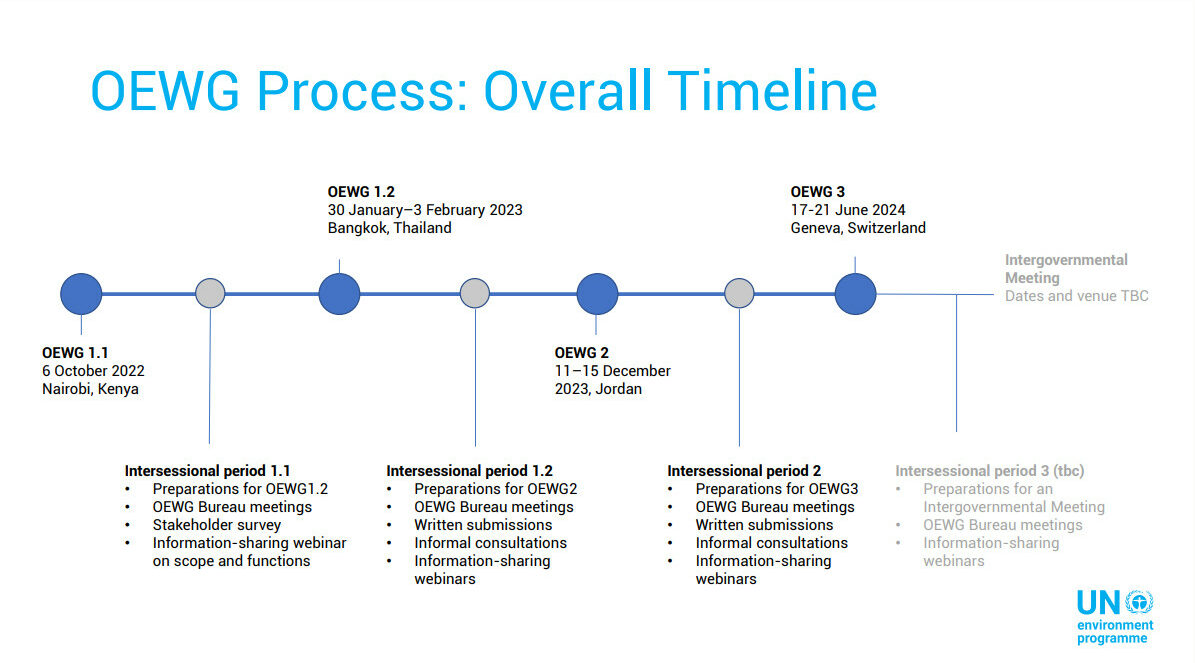
- The second session of the open-ended working group (OEWG 2) will take place from 11 to the 15 December 2023 in Jordan while the third and final meeting will take place in June 2024. While the time for the creation of this SPP is limited, making progress at each meeting is crucial for delivering its ambition. At the end of the process, an intergovernmental meeting will be organized and will adopt the proposals for the SPP.
OEWG 1 Outcomes
- Discussions on the objectives, which text is been left in brackets as: [The objective of the panel is to strengthen the science-policy interface to contribute to the sound management of chemicals and waste and to prevent pollution for the protection of human health and the environment … ]
- Identification of the principal functions of the science-policy panel:

Preparations for OEWG 2
- As the second meeting of the OEWG will take place in December 2023, important deadlines for participation and contributions are coming to an end this month. Participants wishing to attend the OEWG2 meeting are requested to register through the online meeting platform no later than 31 October 2023. In addition to registering online, any delegate designated to receive financial support for travel and daily subsistence allowance are requested to fill out an online form. The deadline to request funding is 30 September 2023.
- Item4 of the Draft Agenda – The preparation of proposals for the establishment of an SPP- will be the key topic for discussion for the purpose of which four working documents have been prepared:
- Scope and objective, functions, and operating principles
- Institutional arrangements and rules of procedure
- Relationships with relevant key stakeholders
- Work-related processes and procedure
- The proposal is to ensure that all elements discussed by the OEWG end up in one single consolidated proposal for the establishment of an SPP. The Secretariat has prepared a skeleton outline of where these proposals can be tabled:
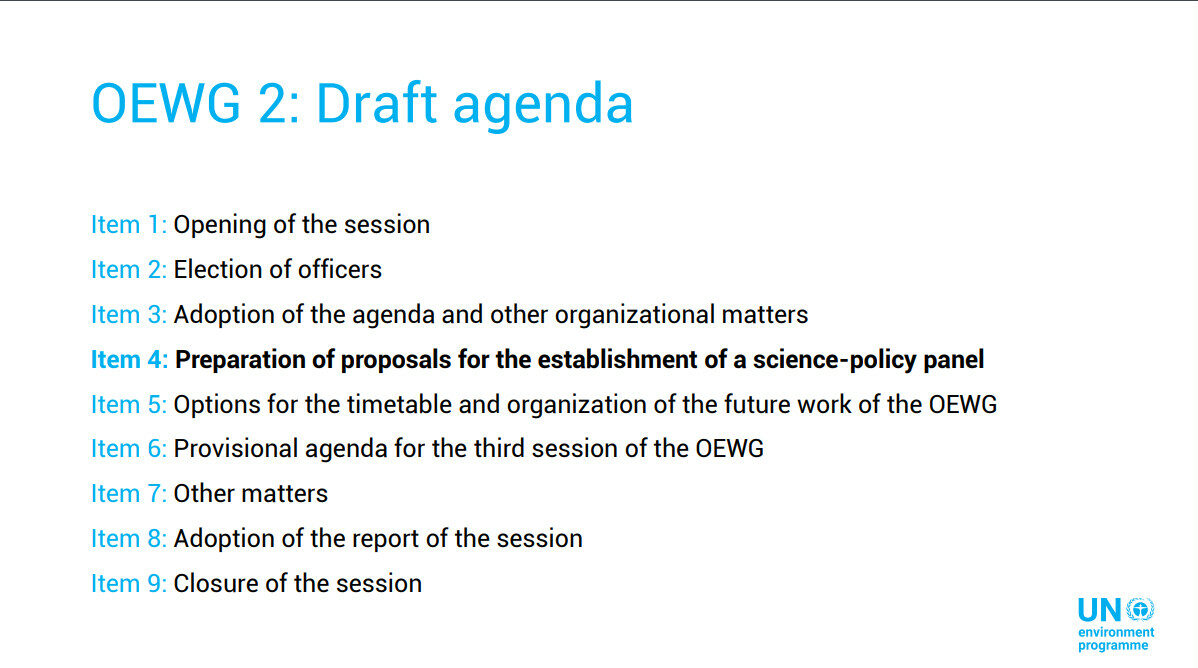

Regional Meetings
In preparations for OEWG 2, organized regional meetings are taking place:
- Asia Pacific: 7 September 2023, hybrid (Bangkok, online)
- Africa: 14 September 2023, Nairobi
- GRULAC: 7 October 2023, Brasilia
- Europe: more information to be shared soon.
Under the Pre-session documents section, advanced unedited versions of documents are available for regional meetings.
Secretariat Outreach Initiatives
Engaging with stakeholders and major groups not only is essential for the creation of a panel that is reflective of all contributions, it will also allow the inclusion of lessons learned from other science-policy panels such as IPBES and the IPCC. We look forward to good exchanges with how stakeholders can contribute to the OEWG and to the panel itself once established.
Gudi ALKEMADE | Chair, OEWG | Deputy Permanent Representative to UN Environment Programme, Netherlands
- The mandate to prepare proposals for the science-policy panel on chemicals, waste, and pollution prevention by the end of 2024 should not be taken lightly. Addressing the triple planetary crisis of climate change biodiversity loss and pollution in an effective manner requires determined, coordinated and concrete action for us to transition to resilient sustainable pathways that can only be effective if rooted in sound scientific evidence.
- The benefits of an SPP to contribute further to the sound management of chemicals and waste and the prevention of pollution are multiple. It may provide effective scientific and policy-relevant knowledge and information to address multiple challenges related for example to health, climate, and biodiversity, but also food security, energy access, and more. We must create an effective body using in our favor the lessons learned from other panels and science policy interfaces and to ensure that the panel starts to do relevant work for the benefit of all.
- As outlined in UNEA resolution 5/8, taking into account stakeholders’ views and stakeholder engagement are crucial to ensure that the voices of civil society, the private sector, and academics are upheld.
- Many people are interested in this process, meaning the panel holds enormous potential and can benefit from the commitment and engagement of the relevant stakeholders. Ways to continue voicing this interest are providing submissions, participating in webinars and engaging in the outreach done by member states, the Secretariat, the bureau members, and in the plenary and the contact groups. Stakeholders should organize among each other to ensure their voices are heard in an effective manner through the available platforms.
- As we embark on the intersessional periods leading to the OEWG-2, it is paramount that in our next session, we can make significant progress towards the preparations of the outcome document. It is my hope that member states, the Secretariat, and stakeholders can effectively contribute to this mandate and that the inputs generated during this webinar will help prepare for our collective efforts to develop the proposals.
Engagement of Major Groups and Stakeholders in the OEWG Process
Accreditation and Participation Modalities under the UNEA Rules for All Major Groups and Stakeholders
Laetitia ZOBEL | Programme Management Officer, Civil Society Unit, Governance Affairs Office, UNEP | Moderator
Organization of stakeholders engagement in OEWG 1.2 and OEWG 1.2
- Those who can participate as major groups and stakeholder observers to the meetings are:
– UNEP-accredited observers
– ILO-accredited NGOs
– WHO-accredited NGOs
– SAICM-accredited NGOs
– BRS (Basel, Stockholm, and Rotterdam Conventions) accredited NGOs
– Minamata Convention registered ngos
– Montreal Protocol registered NGOs
Accreditation of Major Groups and Stakeholders
- Observers, Civil Society / Major Groups must be accredited to either of the MEAs secretariats or UNEP sister agencies through the registration portal and following the accreditation process. To participate in OEWG 2, proof of accreditation will be necessary for registration.
- Independent scientists or researchers whose institutions or universities are not accredited to any MEA or UNEP, need to find a relevant host who is accredited.
Morning Briefings, and Preparations by MGS Towards, Statements and Contributions
UNEP encourages self-organization by all major groups, which has been effectively undertaken by some of the major groups; constituencies and networks that have been keeping in touch and are meeting intersessionally. This opportunity should be uptaken also by newly accredited or registered MGS. Other opportunities for engagement include:
- webinars/ online meetings by major groups constituencies or relevant networks
- one day Civil Society meeting/ Forum prior to OEWG 1 and OEWG 2 for Civil Society actors to connect prior to the actual session
- daily morning briefings in dedicated room with rotating chairman ship during OEWGs
- coordination of statements and briefings
Seating Arrangements

Statements and submissions by MGS to the OEWG Process
- Oral statements made in plenary by MGS are uploaded in writing on the OEWG website
- Consideration of the potential option of written submission by MGS to engage prior to the OEWG 2 session- depending on interest by Civil Society and the decisions by the Secretariat
- MGS representatives will be invited to also sit and contribute in relevant contact groups during the OEWG session, depending the chair’s direction on the number of participants and speakers as well as the seating capacity in the relevant rooms of the contact groups.
OEWG 1 and OWEG 2 Major Groups and Stakeholders’ Engagement
Mohamed ABDELRAOUF | Co-Chair, Science and Technology Major Group to UNEP
- Ahead of OWEG 1.2 in Bangkok in January 2023, the major groups and stakeholders to UNEP and other related MEAs and other independent groups held an international major groups and stakeholder consultation day. This hybrid meeting discussed major groups’ engagement, whether accredited or not accredited; prepared statements, interventions and organized seating and communications. Preparations for this days started a few weeks before OEWG 1, and benefitted from the work of a small committee and UNEP’s Civil Society unit.
- The day resulted in the fruitful engagement of a large number of major groups and stakeholders from almost all nine major groups and from other MEAs and international organizations. Topic discussed included internal organization, engagement, statements, as well as topics on the table at the time such as the scope and functions of the SPP and how major groups can be involved.
- This preliminary idea collection occasion also discussed priorities and best engagement modalities and resulted in a number of general agreements of what will be done during the open-ended working group 1.2, including the different preliminary statements. Thanks to this coordination effort we secured seats and favored good participation in one of the deep dive sessions, and ensured a bilateral meeting with UNEP’s chief scientist and head of the economy division.
- As co-chair of the Science and Technology major group and of the nine major groups of UNEP, we will continue to follow the strategy of engaging accredited and unaccredited bodies. Having a unit specifically for science gathered a lot of interest from various scientists and scientific organizations attending the meeting and also independent scientists during the meeting. We provided them with a lot of space to present some joint statements.
- During OEWG2 we need to go one step further, following the example of what is being done for the Plastics Treaty Intergovernmental Negotiating Group: established an interest group from different accredited universities, major groups, and non-accredited international ones, independent ones so that everyone interested in the topic can join this group. In the next few weeks, we will establish another one for OEWG-2 and 3 where we can coordinate accredited measure groups, and scientific ones to have one communication exchange of ideas and have a joint statement as much as possible.
Aseel ABO-TALEB | Chemicals, Waste and Pollution Facilitator, Children and Youth Major Group to UNEP
- During the open-ended working group 1.2, the main messages and requests sent by the youth delegates included demands for a multi-disciplinary youth experts group, a gender responsive and inclusive approach as well as the importance of capacity building. The Youth caucus raised attention to the need to bridge the gap between youth and the domain of the science-policy interface.
- The group submitted its Written Submission on the Operating Principles Governing the Work of the SPP and on the Needs and Questions the Panel May Handle. It is currently collecting the inputs in this intercessional period from youth from all over the world to include the different regional contexts and perspectives.
- One of the challenges of ensuring youth participation – besides funding access and accreditations – is attracting youth attention to this science-policy panel and to this process. A lot of efforts was devoted to attract our members to the importance of the future SPP and and the role it will play. Through the continuous capacity building and knowledge sharing, youth delegates participated in previous sessions and when we opened the call for the regional meetings, we received a lot of youth interested in in all three meetings in Pacific Africa and GRULAC regions.
- The coordination started when we nominated youth for each original meeting. We have also been working on coordinating statements and interventions with the youth from each region to be aligned with our submissions, with our OEWG 1 stand, and with our collective interventions and position toward the second session in Jordan. The coordination is still ongoing and the inputs from the regional meetings will be included in the next OEWG.
- Capacity-building played a major role in attracting youth’s attention to this process. One of the upcoming webinars that we are organizing will focus on resolution 5/8 and what happened at OWEG 1.2. We will also have sessions on the route to the second session. Rather than being just an informative webinar, it also is a space for discussions and revisiting our inputs, stands and opening the floor for youth to participate also in the upcoming sessions.
- There are planned activities in terms of highlighting the rules of the SPP and how it plays a very major role in assessing the current status of the environment and and in tackling the triple planetary crisis.
- Opening the floor to the youth constituency, the Childern and Youth Major Group is also following the same approach of the other UNEP major groups, opening the space to non-members that are interested in the process and would like their inputs to be echoed.

David MUNENE | Regional Co-Facilitator of Major Groups and Stakeholders, Africa
- In terms of major groups and stakeholders’ engagement, regional consultations in Africa have been successful thanks to the approach adopted by the Secretariat.
- Issues of chemicals and waste are very context-based. In the context of Africa, they tend to differ quite from other regions as regional consultations clearly highlighted. If this consultation approach is used in the meeting in Jordan, we are likely to have a very rich and inclusive process.
- Expertise was allowed from the major groups and stakeholders and the floor was given to an adequate level, bearing in mind this is a member states-driven process and that possibility depends on availability.
- Bringing to the floor the expertise coming from the grassroots experiences and from the ground, allows MGS to engage their communities of the region during those consultations. Such inputs are also valuable for the Secretariat and we look forward to seeing them being implemented.
- To strengthen their engagement, it is important for major and regional groups to self-organize. It is imperative that in regions also engage in processes mirroring what the Children and Youth have done and contextualizing those. For example, the Africa Region met for the Consultation right after the 19th ordinary session of the African Ministry Conference on the Environment, were the issues of chemicals and waste, and their sound management were key in the decisions. We can expect that the African ministers already have taken decisions on how they would like to approach the issue of sound management of chemicals and waste in the continent, even plugging in into the national action plans for the same.
- There is need beyond self-organized consultations at the region and at the major group level to also have coordinated joint interventions because they carry significant weight and can be coordinated easily. It has been previously done for other platforms and engagements and should be replicated in this case
- The Secretariat also has the advantage of the Nairobi-based media groups and stakeholders who could play a role in mobilizing and rallying support for the outcomes of the meeting.
- We have had positions that the secretariats feel are very important and pertinent but for some reason, the communication does not get to even the member states as perhaps they hope it would be the other way around and the member states feel there is something or some process that would otherwise be enhanced.
- Major groups and stakeholders have stepped in most cases and the best case study would be the process of the Kunming-Montreal Global Diversity Framework where a lot of what went into the targets and the four goals also came from the non-state actors themselves.
- Nairobi-based major groups and stakeholders should really be sensitized about the significance of this and we are happy to help in engaging them even further.
- During the region for Africa, we discussed the tendency for people to shy away when things get technical and scientific. This has been a pitfall that we identified during the regional consultations as there is a growing tendency to include mostly scientists and policymakers during technical discussions, while we forget the key stakeholders of the process are also the link to demonstrate where the effects of chemicals and waste affect the most, in this case, we invite expertise, not just imply technical expertise but also representational expertise as they play an important link to reach out to context within their respective countries.
- Organizing capacity-building sessions – not just amongst the various media groups of the regions but also for the entire major groups’ constituencies and, in terms of the technical significant and the contextual significance of chemicals and waste in the times of today is very important, and this can also be coordinated through the major groups facilitating committee.
Question and Answers
Q: Will there be any call for submissions to express views prior to the actual meeting?
Tessa GOVERSE: The modalities that we have to actually hear from you obviously include also through kind of written submissions. This is something that is to be discussed in the bureau with the specifics on what point we might sort of close for it in submissions because it is also important that these are made available to participants ahead of the meeting. On our website we will indicate how and when you can contribute, we look forward to hear from you.
Mrinalini RAI | Director, Women4Biodiversity
- The last meeting that we had in Bangkok for the SPP was about collaborative efforts. Opportunities for major groups and stakeholders around the SPP included engaging with collective submissions either at the plenary of the SPP and following discussion for future calls for submissions.
- Major groups are working to build synergies, for instance by participating and contributing to other international environmental processes and consultations and bringing them to the Jordan meeting table.
- Another modality is cooperation between the different MEAs to highlight linkages and break out from silos, using to our advantage the fact that many of us wear multiple hats of different constituencies.
- Through this cross-sharing of information from all these different meetings and decisions, we aim to support the work of the SPP, collaborations for both the constituencies and states or member states parties are key to really engaging at the constituency level and also the national level.
- The SPP document that refers to stakeholder engagement is very well put together and it also will be really helpful because it has taken the recommendations of different platforms, including the IPBES the IPCC and others.
- Stakeholders’ engagement is really important because where you have the science-policy experts or the member states meeting, rights holders must also take part of the discussion, defining civil society in the broadest possible way including indigenous peoples, local communities, women and youth to make sure that there is this collective knowledge sharing. Every one of us has very different life experiences and having their engagement and knowledge with would really strengthen the work of the SPP.
- Hoping this framework will really be as inclusive as it has been so far, it is important to remind that participation does not only mean attending these meetings but also ensuring that when scientific panels, engagements roundtables or high-level events happening, all these relevant stakeholders are also represented into those seatings or these decision-making spaces.
Q&A
Q: Would you like to share perspectives and good examples of science and technology case studies relevant to capacity building? What are the best opportunity to do this in Jordan?
Nalini Sharma | Programme Management Officer, UNEP
We do have preceding days prior to the second session in the form of Regional Preparatory meetings and stakeholders preparatory meetings. On the Saturday, we are having discussions about the topics and while this is still in design, we can take on board your suggestion, and make a proposal. Further details on the planning for those preceding days will be provided in due course.
Q: What is the best and most effective way to put across our key messages in the Civil Society major groups? Is it best to intervene on the key days of the events or do after 100, 200, or 600 work piece of ideas or key messages we want to convey to particular members of the society unit or major groups and submit this in advance?
Laetitia Zoebel: Reaching out to major group representatives or focal points is the best way to proceed, as coordinated statements are easier to convene against lacking time or capacities in the room
Mrinalini RAI: Nairobi is going to host the CBD meeting next month, is there a possibility to organize a side event prepared for the parties at the CBD that could be a great way to get them involved in the process?
Griffins OCHIENG | CEJAD and IPEN
- Speaking for developing countries and representing the African region, as major groups we must engage with focal points because the Secretariat has been making important efforts to have meaningful participation and engagement.
- It would be great even as we develop our position in our role of complementing governments to engage, explain and provide information to regional groups to allow stronger regional engagement in the SPP-OEWG work.
Highlights
Video
Live on Webex.
Stakeholders Participation in OEWG2
Participants wishing to attend the OEWG2 meeting are requested to register through the online meeting platform no later than 31 October 2023.
In addition to registering online, any delegate designated to receive financial support for travel and daily subsistence allowance are requested to fill out an online form. The deadline to request funding is 30 September 2023.
Links
- Road to OEWG 2 | Science-Policy Panel to Contribute Further to the Sound Management of Chemicals and Waste and to Prevent Pollution / SPP-CWP Series
- Developing a Global Science-Policy Panel on Chemicals, Waste and Pollution Prevention
- Geneva addressing Hazardous Substances
Documents
Photo Credit
Copyright: IISD / Earth Negotiation Bulletin | Delegates from the Major Groups pose for a group photo, UNEP SPP OEWG1, 1 February 2023.
